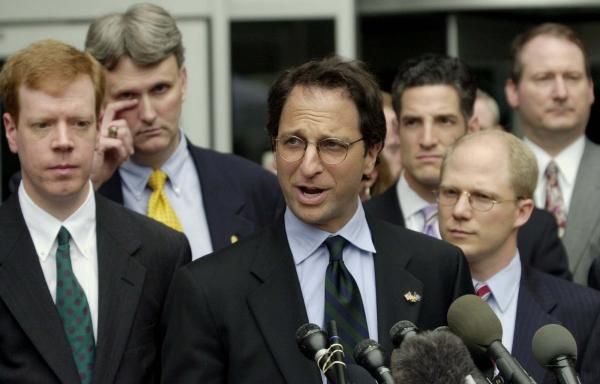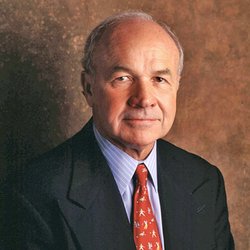 Given that the governmental onslaught against business interests over the past several years is still a relatively recent occurrence, my sense is that we’re still too close to it to be able to place it in the proper perspective.
Given that the governmental onslaught against business interests over the past several years is still a relatively recent occurrence, my sense is that we’re still too close to it to be able to place it in the proper perspective.
However, with each passing week, new research on this dubious use of governmental power is bringing that perspective into focus.
With exquisite timing, John Hasnas, who has written extensively on the untenable corporate criminal liability standard, has organized an interesting conference for March 15th in Washington at the Georgetown University Law Center entitled Corporate Criminality: Legal, Ethical, and Managerial Implications.
Professors Ellen Podgor of the White Collar Crime Prof Blog and former Houstonian Christine Hurt of the Conglomerate blog will be among the participants, as will University of Houston Law Center Professor Geraldine Szott Moohr, who has written and spoken extensively on the injustice of the Martha Stewart prosecution. This is shaping up to be one of the most important criminal and business law conferences of the year, so if you are in or near the DC area on the 15th, don’t miss it.
Professor Hasnas’ inclusion of Professors Podgor and Hurt in the conference is prescient because both have recently authored important papers on two particularly troubling areas of the criminalization of business problem.
Professor Podgor’s timely Yale Pocket Part article entitled “Throwing Away the Key” examines the brutal nature of the prison sentences that have been handed down over the past several years to businesspersons.
What makes those sentences all the more appalling is that prosecutors often played on societal bias against wealthy businesspeople to obtain them even though the factual circumstances of many of the cases oozed with reasonable doubt of guilt.
Professor Podgor goes on to note that huge sentence disparities have given prosecutors enormous power to control the process, allowing prosecutors throughout the Enron criminal cases to display Jamie Olis’ 24+ year prison sentence as a symbolic head on a stake in a daunting example of the price of non-cooperation.
The severe consequences that Olis suffered for having the temerity to defend himself at trial was a key element throughout the Enron criminal trials as defendants were convicted largely on the basis of testimony from cooperating witnesses and the Enron Task Force threatened Olis-like treatment to pressure dozens of witnesses with exculpatory testimony for the defendants not to testify.
Professor Podgor squarely questions whether the sentencing disparities combined with plea bargaining places too much power in the prosecution’s hands, an issue that Yale Law Professor John Langbien addressed in the following passage years ago:
Plea bargaining concentrates effective control of criminal procedure in the hands of a single officer. Our formal law of trial envisages a division of responsibility. We expect the prosecutor to make the charging decision, the judge and especially the jury to adjudicate, and the judge to set the sentence. Plea bargaining merges these accusatory, determinative, and sanctional phases of procedure in the hands of the prosecutor.
Students of the history of the law of torture are reminded that the great psychological fallacy of the European inquisitorial procedure of that time was that it concentrated in the investigating magistrate the powers of accusation, investigation, torture and condemnation. The single inquisitor who wielded those powers needed to have what one recent historian has called ‘superhuman capabilities [in order to] . . . keep himself in his decisional function free from the predisposing influences of his own instigating and investigating activity.'”
I cannot emphasize too strongly how dangerous this concentration of prosecutorial power can be. The modern prosecutor commands the vast resources of the state for gathering and generating accusing evidence. We allowed him this power in large part because the criminal trial interpose the safeguard of adjudication against the danger that he might bring those resources to bear against an innocent citizen — whether on account of honest error, arbitrariness, or worse.
Meanwhile, Professor Hurt announced last week the SSRN publication of her important new paper on the criminalization of business — The Undercivilization of Criminal Law. In her paper, Professor Hurt examines the increased use of the criminal justice system to regulate business, particularly the corresponding increase in the inevitable cases in which a defendant is convicted of a crime over which reasonable doubt of guilt exists.
At the same time, Professor Hurt points out that legislators and judges have made the use of civil lawsuits to regulate business more difficult despite the fact that the negative effects of an erroneous civil judgment of liability on a defendant pales in comparison to the impact of a wrongful conviction of guilt in a criminal case.
In making this point, Professor Hurt channels an observation that her colleague Larry Ribstein has long maintained — that is, the civil justice system is a far superior mechanism for allocating responsibility than the criminal justice system, where criminalizing merely questionable business conduct guts the protection of the reasonable doubt standard.
A short blog post cannot do justice to either Professor Podgor’s article or Professor Hurt’s paper, so I highly recommend that you read both. There is no doubt that these scholars have seized on issues that are fundamentally important to the future of American business.
The huge human toll that cases such as the Olis case, the Nigerian Barge case and the Lay-Skilling case have on their participants and their families is bad enough alone to justify a change in the odious regulation of business-through-criminalization policy.
Similarly, the massive affront to justice represented by the prosecutors’ abusive tactics in obtaining tainted convictions of businesspersons also calls this policy into serious question, as others are noticing.
But apart from the human toll and the abuse of prosecutorial power, the increased regulation of business through criminalization is simply bad public policy that costs us jobs in communities and wealth in investments.
Apart from the direct loss of jobs and wealth that resulted from the Arthur Andersen debacle and the meltdown in the energy trading industry that occurred as a result of Enron’s demise, a devastating impact of these business prosecutions is that they obscure the true nature of risk and fuel the myth that investment loss results primarily from criminal misconduct.
As Professor Ribstein has often pointed out, do we really want to be sending a message to American investors that risk is bad despite the fact that it often leads to valuable innovation?
How does throwing creative and productive business executives such as Michael Milken and Jeff Skilling in prison do anything for educating investors about the true nature of risk and the importance of diversification?
By way of example, self-settled derivative prepay transactions are not particularly intuitive (no product actually changes hands) and are not well understood by even many smart businesspeople outside the trading business.
Nevertheless, such transactions provide the valuable benefit of hedging risk for companies, who pass along that benefit to consumers in the form of more competitive prices for their products and services.
Do we really need to allow prosecutors to paint such beneficial transactions as frauds and manipulate ignorance about them as a means to regulate questionable business conduct?
A truly civil society would find a better way.
Like this:
Like Loading...
 For you doctors out there who believe that what happened to Jeff Skilling could never happen to you, take a moment to read the NY Times’ John Tierney’s chilling opening blog post on the re-trial of Dr. William Hurwitz, the Virginia doctor who is a sacrificial lamb for America’s voracious drug prohibition policy. Dr. Hurwitz is being prosecuted on drug trafficking charges for prescribing pain medications that his patients allegedly abused or sold without his knowledge:
For you doctors out there who believe that what happened to Jeff Skilling could never happen to you, take a moment to read the NY Times’ John Tierney’s chilling opening blog post on the re-trial of Dr. William Hurwitz, the Virginia doctor who is a sacrificial lamb for America’s voracious drug prohibition policy. Dr. Hurwitz is being prosecuted on drug trafficking charges for prescribing pain medications that his patients allegedly abused or sold without his knowledge:








